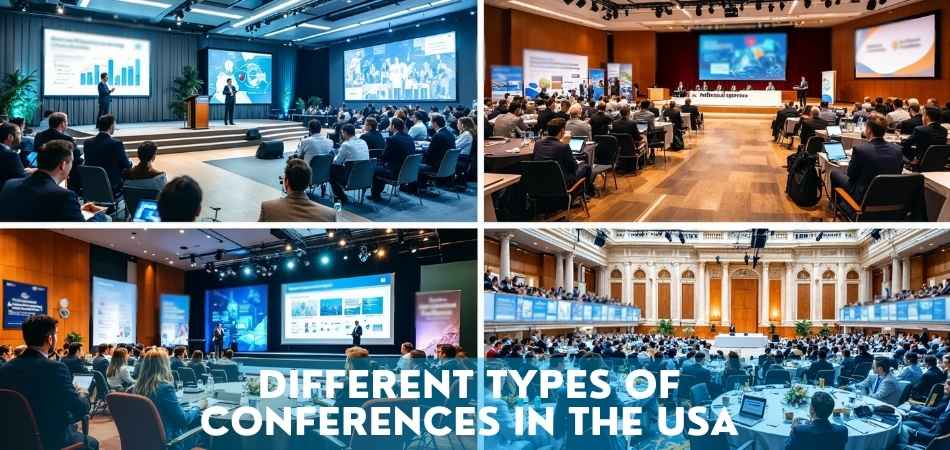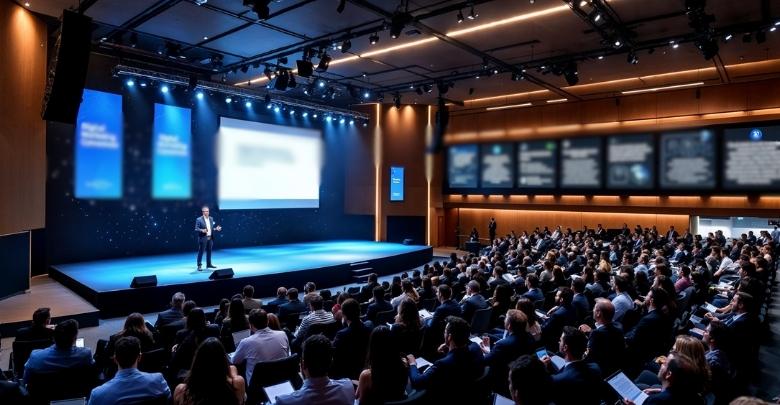Conferences are essential to bringing together professionals, experts, and enthusiasts from a variety of fields to exchange ideas. From educational events to industry-specific gatherings, the USA offers a wide range of conferences that cover various sectors. If you’re seeking information on “What are the different types of conferences in the USA?” you’re in the right place.
The USA hosts various types of conferences, such as academic, business, technology, medical, and government conferences. Academic events focus on research, business conferences cover industry trends, tech conferences showcase innovations, medical conferences discuss healthcare, and government events address policy and governance.
If you would like to know more about the different types of conferences in depth and find out which one is right for you, then keep reading!
What Are the Different Types of Conferences in the USA?
Conferences in the USA provide opportunities to connect, learn, and grow. They bring together professionals from various fields to discuss trends, research, and innovations. Here’s a look at the different types of conferences you can find across the country.

Academic Conferences
Academic conferences are crucial for students, researchers, and educators. These events focus on the latest research and developments in specific fields. Attendees present papers and share findings with experts. They are great for networking with peers and experts in your area of study.
Business Conferences
Business conferences attract professionals from a variety of industries. They focus on the latest market trends, strategies, and challenges. These events provide valuable insights into business growth and innovation. Participants can also expand their networks and collaborate with potential partners.
Industry-Specific Conferences
Industry-specific conferences are specific to particular sectors, such as finance, education, or energy. These events focus on trends, challenges, and innovations unique to that industry. Many international conferences in USA bring together global experts to discuss sector-specific advancements. They provide opportunities for specialized knowledge-sharing and professional growth.
Technology Conferences
Technology conferences showcase the latest advancements in tech. They focus on software, hardware, AI, and cybersecurity, among other topics. These events often feature demonstrations of new products and services. Technology conferences are ideal for those wanting to stay ahead in a fast-paced industry.
Medical Conferences
Medical conferences are vital for healthcare professionals to stay informed. They cover the latest research, treatment options, and medical innovations. Top doctors and researchers lead workshops and sessions at these events. They also allow for collaboration across different fields of medicine.
Government Conferences
Government conferences address critical policy issues and governance. Politicians, activists, and leaders are often involved in these conferences. These events aim to discuss and develop solutions to pressing societal challenges. Government conferences provide a platform for sharing ideas and influencing public policy.
How Do Academic Conferences Drive Research Collaboration?
Academic conferences are essential for developing research collaboration and advancing knowledge. These gatherings bring together scholars from various fields to share ideas, discuss findings, and explore new avenues of study. Here’s how academic conferences drive research collaboration and innovation.
Sharing Groundbreaking Research
Researchers present their latest findings to peers and experts. These presentations spark discussions that refine ideas and improve research quality. Constructive feedback helps scholars identify strengths and weaknesses in their work. This process leads to stronger studies and new areas of exploration.
Building Professional Networks
Networking at academic conferences creates long-term research partnerships. Meeting experts in the field opens doors to collaboration and mentorship. Strong connections lead to future joint projects and funding opportunities. Academic events encourage relationships that extend beyond the conference setting.
Encouraging Cross-Disciplinary Studies
Collaboration across different disciplines leads to innovative solutions. Academic conferences bring together experts from various fields to discuss shared interests. These discussions help researchers apply knowledge from one field to another. Cross-disciplinary studies often result in groundbreaking discoveries and new methodologies.
Facilitating Funding Opportunities
Funding organizations attend academic events to identify promising research projects. Scholars get a chance to present their work to potential sponsors. Direct interactions with funding bodies increase the likelihood of securing grants. Financial support allows researchers to expand and refine their studies.
Enhancing Skills and Knowledge
Workshops and panel discussions provide hands-on learning experiences. Experts share insights on research methodologies and best practices. The importance of academic conferences lies in their ability to support continuous learning and skill development. Participants gain new knowledge that improves their research quality and impact.
Increasing Research Visibility
Presenting at academic events enhances a researcher’s reputation. Studies gain exposure, leading to citations and collaborations. Increased visibility helps researchers establish credibility in their field. Recognition from peers can lead to invitations for future research projects.
What Makes the USA a Popular Conference Hub?
The USA has become a leading destination for conferences worldwide. With its world-class facilities and diverse opportunities, it’s no surprise that so many global events are held here. Here’s why the USA is a popular conference hub:
World-Class Infrastructure
The USA is home to world-class conference venues and facilities. These locations can host both small and large-scale events. Modern technology is widely available to support seamless events. Comfortable accommodations and easy transport further enhance the experience.
Diverse Range of Industries
From technology to healthcare, the USA hosts conferences across various industries. Professionals from all sectors gather to exchange ideas and strategies. The variety of industries attracts a wide range of attendees. This diversity promotes collaboration and innovation at each event.
Access to Leading Experts
The USA is home to many global thought leaders and experts. Conference organizers often invite high-profile speakers from around the world. Attendees have the opportunity to learn from the best in their fields. This access to expertise makes events in the USA highly valuable.
Networking Opportunities
Networking is one of the key benefits of attending conferences in the USA. Events provide a space for professionals to connect and collaborate. The diverse mix of industries allows attendees to form new partnerships. These connections often lead to long-term business relationships and collaborations.
Cultural and Geographical Variety
The USA’s vast size offers a variety of conference locations, from bustling cities to scenic venues. Participants can choose from many unique settings. This geographical diversity makes it easy to select the perfect venue for any event. Cultural variety also enriches the overall conference experience.
Supportive Government and Industry Programs
Government and private industry support play a significant role in making the USA a conference hub. Many organizations offer grants and sponsorships to encourage conferences. These resources help create high-quality, well-organized events. This support ensures that conferences run smoothly and successfully.
How Do Conference Formats Vary Across Industries in the USA?
There is a wide range of conference types in the USA, depending on the needs of the industry and the engagement of the audience. Each sector has unique formats to suit professionals, researchers, and business leaders. Here’s how conference formats differ across industries in the USA.
Academic Conferences
Academic events focus on research presentations and knowledge exchange. These conferences feature keynote speeches, panel discussions, and paper presentations. Many include peer-reviewed sessions where scholars discuss new findings. Workshops and networking help researchers collaborate on future studies.
Business Conferences
Business conferences emphasize networking, strategy, and market trends. These events often include keynote speakers, breakout sessions, and panel discussions. Many feature live product demonstrations and corporate showcases. Attendees engage in discussions about industry challenges and future growth.
Technology Conferences
Technology events showcase the latest innovations and advancements. Keynote speeches highlight groundbreaking developments in AI, cybersecurity, and software. Live demonstrations allow companies to introduce new products to the public. Hackathons and coding challenges encourage collaboration and innovation.
Medical Conferences
Medical conferences focus on healthcare advancements and research. These events include presentations on new treatments, medical case studies, and drug discoveries. Many feature hands-on workshops for practical learning. Networking helps medical professionals collaborate on patient care improvements.
Government Conferences
Government events address policy discussions, regulations, and governance. These conferences include expert panels, town hall sessions, and public policy debates. Attendees discuss pressing issues affecting the country. Workshops help leaders develop solutions for complex challenges.
Industry-Specific Conferences
Sector-focused conferences are dedicated to industries like finance, education, and energy. Each event highlights trends, challenges, and regulatory updates. These conferences often include specialized training and certification programs. Participants gain insights tailored to their industry’s needs.
Conferences Across the USA: How to Adapt to Regional Differences
Conferences in the USA vary based on location, culture, and industry focus. Each region offers unique opportunities and challenges for attendees and organizers. Here’s how to adapt to regional differences when attending or planning conferences.
Being Familiar With Local Business Culture
Different regions have unique business practices and etiquette. The East Coast favors formal networking, while the West Coast adopts a relaxed approach. The South values hospitality and relationship-building in professional settings. Knowing these cultural differences helps attendees connect more effectively.
Adapting to Climate and Weather
Weather conditions vary greatly across the USA. Conferences in colder regions require appropriate attire and travel considerations. Warmer climates may call for lighter clothing and hydration planning. Checking forecasts in advance helps attendees prepare accordingly.
Understanding Regional Industry Trends
Each region has dominant industries that shape conference topics. The West Coast focuses on technology and entertainment innovations. The Midwest emphasizes manufacturing, agriculture, and logistics. Understanding regional industry strengths helps attendees align their goals.
Adjusting to Time Zones and Schedules
The USA spans multiple time zones, affecting travel and event schedules. Attendees should plan for potential jet lag when traveling across regions. Conferences often adjust schedules to accommodate national and international visitors. Time zone awareness ensures smooth participation in sessions and networking.
Engaging with Local Networking Styles
Networking approaches vary across the country. The Northeast favors direct, fast-paced discussions, while other regions may take a more relaxed approach. Understanding cultural considerations at conferences in the USA helps professionals adapt their communication styles and build stronger connections. Being aware of these differences enhances networking success at regional events.
Exploring Regional Attractions and Experiences
Conference locations offer unique cultural and entertainment experiences. Major cities provide historical landmarks, museums, and vibrant nightlife. Smaller towns highlight local traditions, food, and outdoor activities. Exploring the area enhances the overall conference experience.
Frequently Asked Questions
Conferences are vital platforms for knowledge sharing, networking, and industry advancement in the United States. With so many types of events available, it’s natural to have questions about their structure, benefits, and opportunities. Here are some frequently asked questions to help you understand conferences in the USA better.
What Are Hybrid Conferences and How Do They Work?
Hybrid conferences combine in-person and virtual experiences, allowing attendees to participate from anywhere. These events use live streaming, interactive chat rooms, and virtual networking opportunities. Hybrid formats increase accessibility, making it easier for global participants to engage. Many industries use hybrid conferences to reach a wider audience.
How Do Virtual Conferences Differ From In-Person Events?
Virtual conferences take place entirely online, eliminating the need for travel. They offer webinars, digital networking, and interactive sessions via online platforms. While convenient, virtual events may lack the personal interaction found in physical conferences. However, they provide cost-effective learning and engagement opportunities.
What Are the Benefits of Attending Industry Panels at Conferences?
Industry panels bring together experts to discuss key trends and challenges. Attendees gain insights from experienced professionals and thought leaders. These discussions often include Q&A sessions, allowing for audience interaction. Industry panels help participants stay informed about the latest developments in their field.
How Can Startups Benefit From Attending Business Conferences?
Startups can gain exposure, investors, and partnerships at business conferences. These events provide networking opportunities with industry leaders and potential clients. Many conferences feature pitch sessions for startups to showcase their innovations. Attending business conferences can help startups build credibility and accelerate growth.
What Are Leadership Summits, and Who Should Attend?
Leadership summits focus on executive development, strategic planning, and management skills. These events attract CEOs, managers, and entrepreneurs. Leadership summits provide insights into business growth, team management, and corporate strategy. They are ideal for professionals seeking career advancement and organizational success.
How Do Government Conferences Influence Public Policy?
Government conferences bring together policymakers, industry experts, and public representatives to discuss regulations and governance. These events shape policy decisions through discussions, presentations, and workshops. They provide a platform for addressing societal challenges. Attendees can contribute to policy recommendations and reforms.
What Is the Role of Trade Shows in Business Conferences?
Trade shows are exhibitions where businesses showcase products and services to potential clients and investors. They are common at business and industry-specific conferences. Companies use trade shows to demonstrate innovations, generate leads, and build brand awareness. These events offer direct access to target markets.
Bottom Line
The USA offers a wide array of conferences dedicated to various industries and interests. From academics to healthcare, business to technology, each event serves as a platform for networking, learning, and collaboration. When exploring What are the different types of conferences in the USA?, you’ll find opportunities that appeal to professionals, researchers, and enthusiasts in every field.
Conference formats and styles vary by region, with each region offering unique insights based on culture and industry. Whether you are looking to expand your network, gain new knowledge, or stay ahead of trends, attending conferences in the USA provides invaluable benefits for personal and professional growth.







